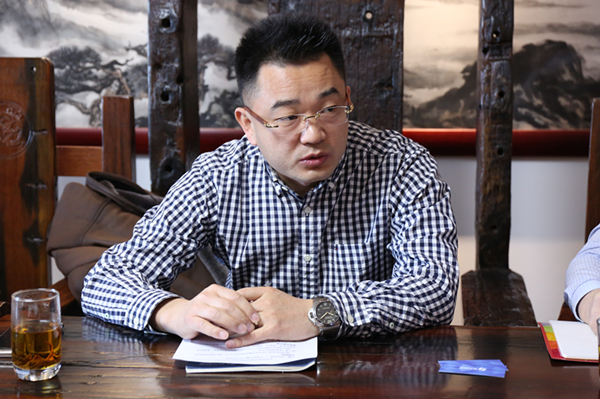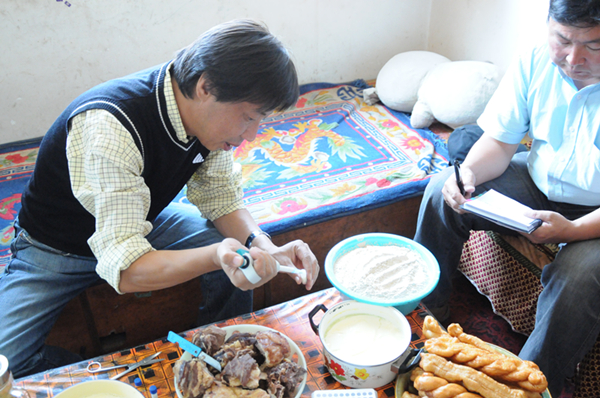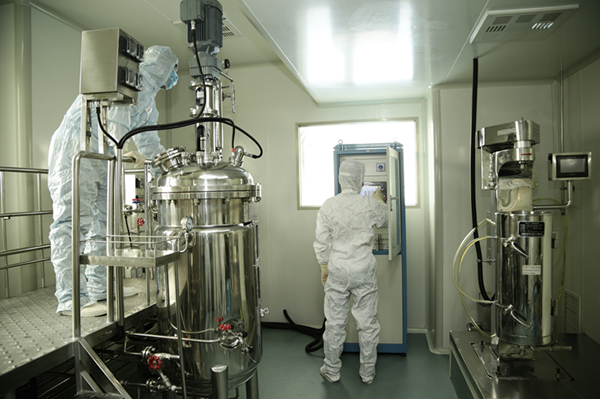Largest library of probiotics built in China
- By Zhang Rui
 0 Comment(s)
0 Comment(s) Print
Print E-mail China.org.cn, March 30, 2018
E-mail China.org.cn, March 30, 2018

A Chinese enterprise has built the largest library of probiotics in China and is set to compete with foreign rivals.
Beijing Scitop Bio-Tech Co. was founded in 2003 and has become a leading probiotic company after 15 years of development. It invests heavily in basic research, produces probiotic ingredients as well as relevant products and now has four wholly-owned subsidiaries and four industrial bases.
But what made its president, Liu Xiaojun, most proud is that they now have the core technology gathered from independent research and development, and have established the largest library of probiotic strains in China, breaking the foreign monopoly in this field.
In a recent interview with China.org.cn, President Liu Xiaojun mentioned an unsuccessful deal not long ago, "A foreign probiotic company approached us for cooperation, and then we quoted our strains. But they replied that they thought ours were expensive, on the grounds that things from China should be cheap."

Liu was not happy and hit back: "Yes, China has some cheap things, but China also has some expensive things. China also has many good things." In his opinion, probiotics have no national borders. "Although each probiotic strain has its own characteristics and advantages, the probiotics developed by China are not necessarily weaker than those of foreign strains," he said.
Just as the sources of many plant and animal species have long been monopolized by foreign companies, the core strains of the probiotic industry in China have long been controlled by foreign heavyweights. Due to the monopolization of Western countries, the strains of domestic fermented dairy products are almost all imported, and not only have high production costs, but also restrict the development of the probiotic industry in China.
In the face of the "sources crisis," Professor Zhang Heping, the chief scientist at Scitop Bio-Tech, and his team took the responsibility of promoting the development of the probiotic industry and set out to discover "sources."
Professor Zhang Heping has led the team to collect microbiological samples every year since 2001. The probiotic expert even collected pathogens along the route of Genghis Khan's war path to Europe in order to discover the origin of the Lactobacillus bulgaricus.

In the past 17 years, he has worked hard and his footsteps are all over China, Mongolia, Russia, Kazakhstan, Paraguay and other countries, collecting samples from naturally fermented milk, pickles, sour porridge, sourdough as well as human and animal intestines, and then adopting physiological and biochemical methods and a variety of molecular biology techniques combined to isolate, identify and preserve a total of 7,060 strains of probiotics in 8 genera, 102 species and subspecies, thereby establishing China's largest collection of probiotic strains with independent intellectual property rights.
"All through these years, we have collected probiotic germs from natural sources, and then we have preserved, screened, tested and verified them," Liu Xiaojun told China.org.cn, "We are the ones doing the most in-depth studies in the basic research and development of probiotics. Each of our strains has a detailed source and provenance, and we have published detailed papers in many authoritative scientific journals home and abroad."
The executive pointed out that only in this way can the safety of a strain be fully guaranteed to ensure that derived foods are safe as well. However, their studies of probiotics are always on the road. "Now we have been doing research for nearly 20 years, and we have kept doing research and conducting clinical trials," Liu said. "Take our L. casei Zhang as an example - for more than a decade, we have studied and published more than 100 papers on it alone."
One of the company's major probiotic strains, probiotic Lactobacillus casei Zhang (L. casei Zhang), named after the chief scientist, is a good example. It was discovered by screening technology and an evaluation system established by Professor Zhang. The probiotic strain has completely independent intellectual property rights and is derived from a prairie in Inner Mongolia.

L. casei Zhang was isolated from 243 strains of lactic acid bacteria taken from 43 samples of fermented sour mare's milk, and it is hypolipidemic, immunoregulatory, and antioxidant and can curb growth of intestinal pathogens. It is also the first strain of probiotic in China to have its entire genome sequenced, indicating that the study of probiotics in China has entered the genome era.
Scitop Bio-Tech also developed many other indigenous probiotic strains such as Bifidobacterium animalis subsp. lactis (strain V9) and Lactobacillus plantarum subsp. plantarum P-8. Over the years, the company's scientific research team has published more than 300 papers and applied for 136 invention patents at home and abroad. The lactic acid bacteria developed by the company also received nine national awards.
The concept of probiotics was introduced by the Nobel laureate Elie Metchnikoff, saying the microorganisms can provide health benefits and form a good probiotic network inside humans, animals and plants after they are consumed. Scientists all around the world then began to research the extraordinary microorganisms. In recent years, probiotics have been widely used in medicine, the food industry, animal breeding and agricultural planting, and the market has grown significantly. At the same time, the concept has become increasingly trendier in China, with many bestselling drinks adding probiotics as ingredients.
"But did you know that most Chinese people do not really understand probiotics?” Liu asked. “And they know that probiotics mostly come from dairy products. In fact, the use of probiotics can also significantly reduce the use of antibiotics in animal husbandry. It is not solely used on humankind."
Scitop Bio-Tech now is developing and promoting its own products. For instance, it has made a health care product which has already been used in a hospital in Sichuan Province, effectively improving human intestinal flora. The company also plans to enter the maternal and children's markets and customize different series of probiotic products for different groups of people.
"Probiotics are very important to the greater health industry, and having core technologies is the key," said Liu. According to him, the company uses 25 percent of its profits to conduct research and development. His company has also established a world-class team. Scientific and technical personnel with doctoral and master's degrees make up more than 50 percent of the total staff. In addition, the company has covered the entire industry, from food, health care and animal husbandry to agricultural cultivation and beyond.
The company has also invested hundreds of millions of yuan in a high-tech park in Beijing's Shunyi district, and established a world-class probiotic research and development center with an area of 5,200 square meters. It is mainly used for basic research and development for fields related to micro-ecology, as well as probiotics in the food sector and applied research and development in the fields of health care, animal husbandry and agriculture.
But for Liu and his team, it is just the beginning for China's probiotic industry.
As Gao Ruijun, a managing partner with Sunsoar Brand and collaborator of Liu, put it: "We are fortunate to have such an enterprise in China. Its development in this field is not only about how a company moves forward, but also how it represents the progress of the country."






Go to Forum >>0 Comment(s)